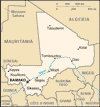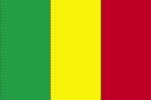AFRICAN HEADS
of State and Governments
ECONOMIC COMMUNITIES & AFRICA REGIONAL BODIES:
JAPAN AFRICA NETWORK'S TOP 10 DESTINATIONS:
- Serengeti National Park (the great migration), Tanzania
- Kruger National Park, South Africa
- Pyramids, Giza Egypt
- Rift Valley Lakes, Kenya.
- Kalahari Desert, Botswana
- Karnak Temple, Egypt
- Table Mountain, S. A.
- Atlas Mountain, Algeria
- Djoudj National Park, Senegal
- Goree Island, Senegal
CONTACT US: E-Mail!
Mali: Our country of the Month, August 2010
Japan Africa Network joins all Malians, friends, wellwishers and all Africans in diaspora to celebrate 50th independence
anniversary on 22 September 2010. Congratulations for 50 years of social and political stability, you are Japan Africa Network’s, Country of the Month September 2010.
Brief History: Mali was at different times in history, part of three famed West African empires(Ghana, Mali, Songhai) which controlled trans-Saharan trade in gold, salt, slaves, and other precious commodities. The Mali Empire(which the country got its name from) reached the height of power in the fourteenth century. Under the Mali Empire, the ancient cities of Djenné and Timbuktu were centers of both trade and Islamic learning. But by 1905, most of Mali was already under French control as a part of French Sudan. In early 1959, French Sudan (later Sudanese Republic) and Senegal united to form the Mali Federation. The Mali Federation gained independence from France on June 20, 1960. But Senegal withdrew from the federation in August 1960, which allowed the Sudanese Republic to become the independent Republic of Mali on September 22, 1960. Modibo Keïta was elected the first president in 1960. President Keïta quickly established a one-party state and was overthroned in a bloodless military coup led by Moussa Traoré in November 1968. Another coup in 1991 led to a transitional government, a new constitution and a multi-party democratic election in 1992. Alpha Oumar Konaré won the presidential election and was re-elected in 1997. President Konaré pushed through political and economic reforms and fought corruption. In 2002, he was succeeded in democratic elections by Amadou Toumani Touré, a retired general, who was the leader of the 1991 military coup and later head of the transistional government. Today, Mali is one of the most politically and socially stable countries in Africa
Economy: Mali's key industry is agriculture with cotton being the country's largest export commodity. Mali has the third highest gold production in Africa (after South Africa and Ghana). Mali's economy has seen a recent 5% growth following sucesssful implimentation of an IMF- recommended structural adjustment program. But the country is still one of the poorest countries in the world depending largely on foreign aids and home remittances from Malians resident abroad.
Tourism: Mali's history is rich with colorful culture and tradition, music and dance, on display all year round. Some of the most famous tourist destinations in Mali are: Bamako, the capital city, the legendary city of Timbuktu (Tombouctou), the Grande mosque du Djenné(the largest mud -built structure in the world and a World Heritage site), the ever-lively port city of Mopti, the river Niger and the extra-ordinary falaise de bandiagara(a World Heritage site), full of scenic villages, unique architecture, and splendid cliffs located in the Dogon country. According to lonely planet.com "If you can visit one place in Mali, go to the Dogon Country: it’s utterly unforgettable".
See country facts below:
Send a Message of Congratulations: Click!
| COUNTRY FACTS: MALI | |
|---|---|
| Name(official): | Republic of Mali |
| Name(short): | Mali |
| Capital City: | Bamako |
| Location: | Western Africa Click to enlarge Map of Mali |
| Coordinate: | 17 00N, 4 00 W |
| Independence: | (from France) September 22nd; 1960. |
| President: |
|
| Type of Government: | Republic |
| Total Area: | 1.24million sq.km. |
| Population: | 13,443,225 (July 2010 est.) |
| People: | Mande 50% (Bambara, Malinke, Soninke), Peul 17%, Voltaic 12%, Songhai 6%, Tuareg and Moor 10%, other 5%. |
| Religion: | muslim 90%, indigenous belief 9%, christians 1%. |
| Languages: | French(official), 80% also speak Bambara, other local languages. |
| Literacy: | 46.4%total, 53.5%male, 39.6%female (2003 est.) |
| Currency: | Communaute Financiere Africaine franc (1CFAF= 100centimes) |
| GDP(per capita): | $1 200 (2009 est.) |
| Arable Land: | 3.76% (2005est.) |
| Agriculture: | Corn, cotton, millet, cattles, sheep, goats,rice, vegetables, peanuts. |
| Natural resources: | Uranium, gypsum, gold, phosphate, kaolin, salt, limestone, granite, hydropower. The unexploited areas include:bauxite, iron ore, manganese, tin and copper. |
| Embassy in Japan: | Embassy of the Republic of Mali, Chancery: 3-12-9, Kami-Osaki, Shinagawa-ku. Post Code: 141-0021 Tel. 03-5447-6881 |
| General Info: | |
| International Phone Code: | +223 |
- Past Countries of the Month
- GABON Country of the Month of August 2010
- MOZAMBIQUE Country of the Month of June 2010
- CAMEROON: Country of the Month of May 1020
- SENEGAL: Country of the Month of April 1020
- GHANA: Country of the Month of March 2010.
Read:Ghana’s 53rd Independence Day Speech
Country Facts: Ghana - GAMBIA: Country of the month of February 2010
- KENYA: Country of the month of December 2009
Read: Kenya Independence Day Speech
Country Facts: Kenya - ANGOLA: Country of the month of November 2009
Read Angola Independence Day Speech
Country Facts: Angola - NIGERIA: Country of the month October 2009

